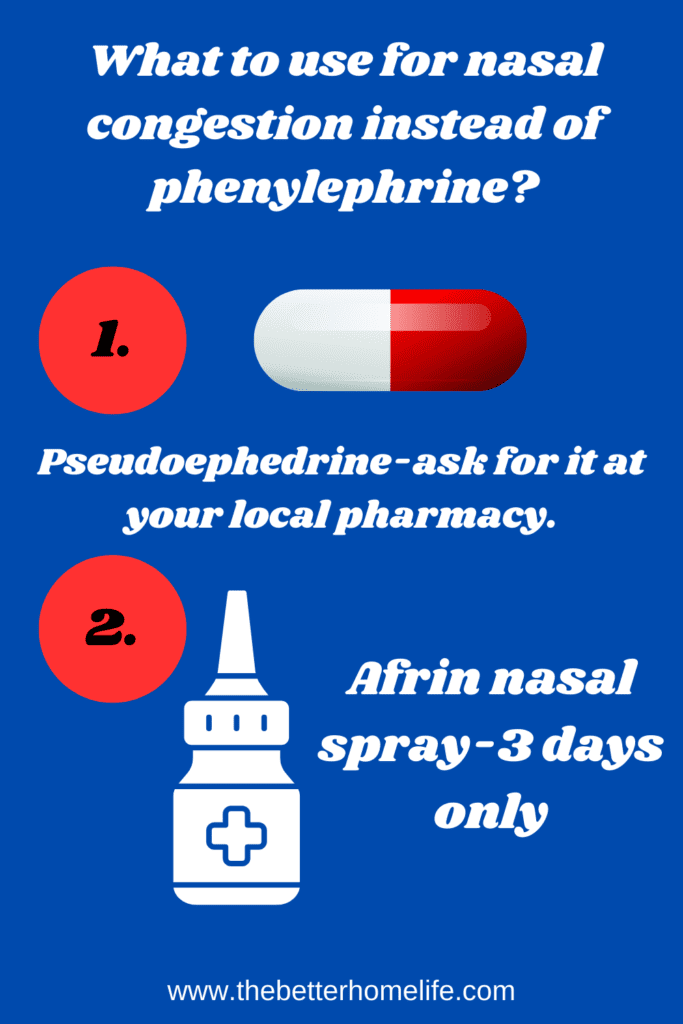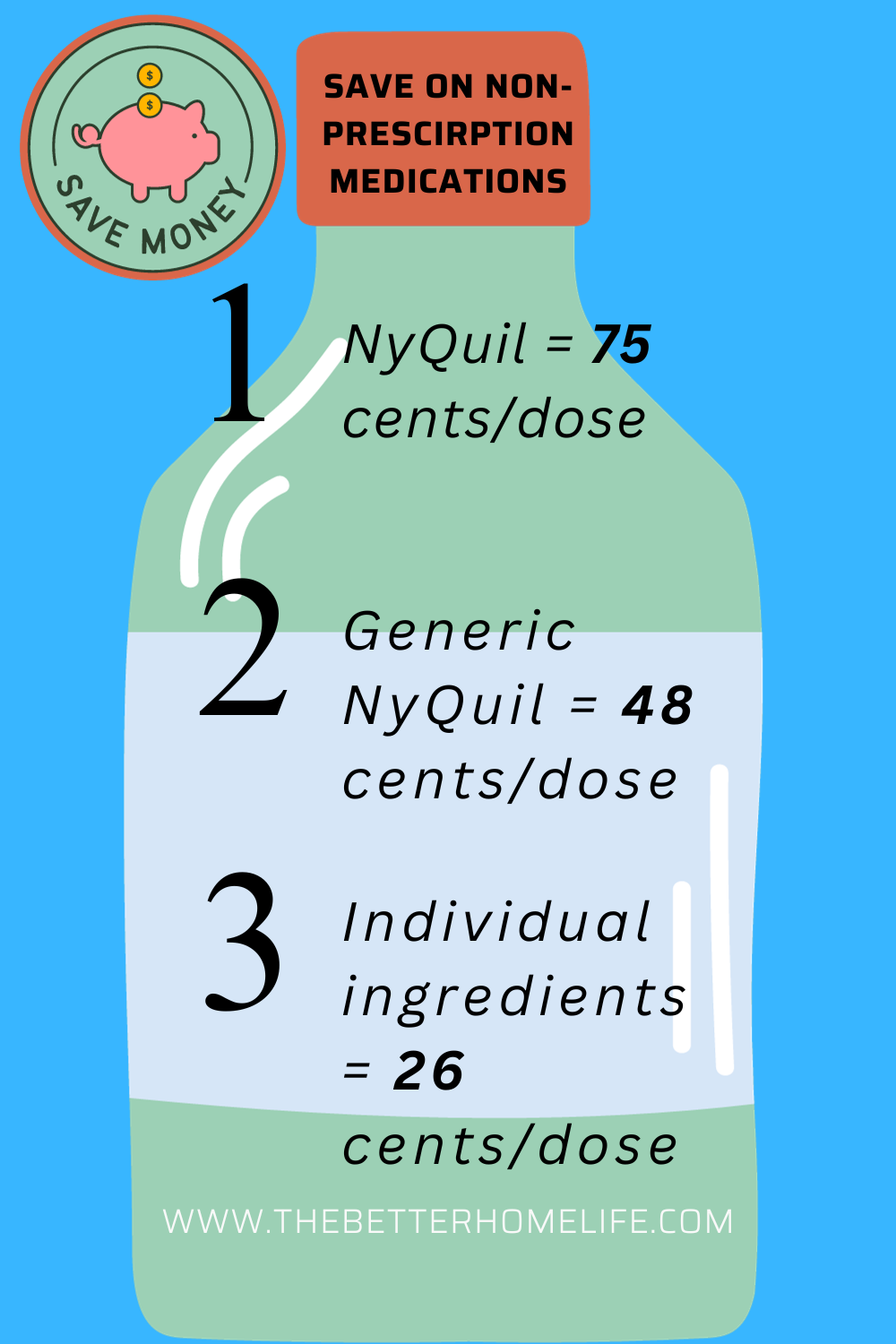I suppose it’s time to help my readers save on over the counter medications. As a pharmacist, I do have plenty of secrets to share with you.
Recently, I was checking out at the grocery store. The cashier told me she was sleepy because she accidently took her night time cough medicine instead of her day time cough medicine. I cringed because there should be no difference. Read on to find out why.
Common symptoms that can be treated at home
- Pain/fever
- Cough
- Sore throat
- Nasal congestion
- Allergies
- Insomnia
- Heartburn
- Constipation
- Diarrhea
How to save money on Cold and Flu medications
Here I will share some secret tips that most consumers do not know about the over the counter cold and flu medications. Pharmacists are always a great reference to help you choose a medication for your symptoms. There are thousands of cold and flu products on the market sold under many brand names, although all of these products are just combinations of very few ingredients.
Disclaimer: Always read the safety information on all over the counter medications. Follow the manufacturer recommended dosing. Ask a doctor or pharmacist before using any over the counter medication if you are pregnant or breastfeeding or have any health conditions, allergies or are taking and medications.
1. Don’t buy oral phenylephrine or any oral product containing phenylephrine
Phenylephrine has been found to be ineffective at treating nasal congestion in oral form. It has no value, but is still on the market to give manufacturers time to reformulate their products. The reason it has been allowed to remain on the market is because it is still considered safe, but not effective. Even though it is not effective you will still have drug interactions and side effects associated with it’s use, but no benefit.
Update: The FDA has moved to remove phenylephrine from the market. All the more reason to find a great alternative soon.
What should you use instead of phenylephrine to treat nasal congestion?
Note: Always follow the product information for dosage, warnings, and contraindications.
If you want an oral medication for nasal congestion your only option is pseudoephedrine, which you do not need a prescription for. You will have to ask a pharmacist for it. It can be found at most local pharmacies for as low as $2.49 for 24 tablets ~ 21 cents/dose, max of 4 doses/day = 84 cents/day.
Another great option for treating nasal congestion is Afrin nasal spray. Afrin can only be used for 3 days. It is dosed 1-2 sprays in each nostril every 12 hours for 3 days. After 3 days, you will need to use something else to treat your nasal congestion.

2. Save on Cold and Flu medications by choosing single ingredient medications
Brand name manufacturers try to simplify your purchase by listing symptoms in the name of their product. You could get the same benefit from taking the individual ingredients for less cost, and you could take only the ingredients you need. Usually a cold starts with fever, body aches and sore throat, then nasal congestion, ending with a lingering cough. It would be better to purchase the individual ingredients and treat only the symptoms you currently have.
Lower cost options for “day time” non- sedating cold and flu medications
Instead of using a combination product like these:
Tylenol Cold & Flu Severe -Current cost is $7.67 for 24 caplets ~64 cents a dose, max of 5 doses per day = $3.20/day
Vicks DayQuil Cold and Flu – Current cost is $16.57 for 48 liquicaps ~ 69 cents/dose, max of 4 doses per day = $2.76/day
Treat only the symptoms you have with the single ingredients in these products:
Acetaminophen – This ingredient is effective for treating pain and fever. If you have body aches, sore throat, other pain or fever, then this ingredient will help. Current cost for 325mg tablets = $2.12 for 100 tablets ~ 4 cents/dose, max of 6 doses 3900mg/day = 24 cents/day (note-this is adult dosing)
Dextromethorphan – This ingredient is a cough suppressant. It is used in adults and children 12 years and older to suppress a cough. It is not always good to suppress a cough. If your cough is productive then an expectorant may be a better choice. Current cost for 15mg soft gels = $8.99 for 100 soft gels ~ 18 cents/dose, max of 4 doses/day = 72 cents/day (note-this is adult dosing)
Guaifenesin – This ingredient is only in the Tylenol Cold & Flu severe, not in Vicks DayQuil Cold and Flu. Guaifenesin is an expectorant that helps thin mucus in the bronchial passages to make it easier to cough up mucus. It is most effective if you drink plenty of water. If you drink plenty of water you will help to thin the mucus anyway. This medication is best used to treat a productive cough. It will not help a dry cough at all. It does not suppress a cough. Current cost for 400mg tablets = $8.79 for 200 caplets ~4 cents/dose, max dose of 6 doses/day = 24 cents/day (note-this is adult dosing)
Phenylephrine – Is found in both Vicks DayQuil and Tylenol Cold & Flu Severe. Phenylephrine has been found to be ineffective at treating nasal congestion. If you do have nasal congestion-use one of my phenylephrine alternative suggestions above.
Lower cost options for “night time” sedating cold and flu medications
Instead of using a combination product like these:
NyQuil Cold & Flu – Current cost $17.88 for 48 liquicaps ~ 75 cents/dose, max of 4 doses/day = $3.00/day (note-adult dosing)
Tylenol Cold + Flu + Cough Night liquid – Current cost $10.67 for 8 ounces ~ $1.33/dose, max of 5 doses/day = $6.65/day
Treat only the symptoms you have with the single ingredients in these products:
Acetaminophen – This ingredient is effective for treating pain and fever. If you have body aches, sore throat, other pain or fever, then this ingredient will help. Current cost for 325mg tablets = $2.12 for 100 tablets ~ 4 cents/dose, max of 6 doses 3900mg/day = 24 cents/day (note-this is adult dosing)
Dextromethorphan – This ingredient is a cough suppressant. It is used in adults and children 12 years and older to suppress a cough. It is not always good to suppress a cough. If your cough is productive then an expectorant may be a better choice. Current cost for 15mg soft gels = $8.99 for 100 soft gels ~ 18 cents/dose, max of 4 doses/day = 72 cents/day (note-this is adult dosing)
Doxylamine – This ingredient is an antihistamine. It is used mostly as a sleep aid because it is very sedating, but also has a drying effect that can help with congestion. If you are taking either of the above combination products to help you sleep, you could save a lot by using the single ingredient. Current cost for 96 – 25mg tablets = $7.17 ~4 cents for a half a tablet dose (12.5mg is the amount in a dose of the 2 combination products above). (Note-this is adult dosing.)
Phenylephrine – Is found in Tylenol Cold + Flu + Cough, but not NyQuil. phenylephrine has been found to be ineffective at treating nasal congestion. If you do have nasal congestion-see my phenylephrine alternative suggestions above.
3. Buy generic cold and flu medications
I am a pharmacist and I almost always buy generic medications. They work just as well as brand name medications for a fraction of the cost. There are a couple of exceptions. I prefer brand name for flavored medications. Liquid or chewable medications often taste better if you buy brand name. The other exception is nasal sprays. I have found brand name Afrin to sting less than the generic.
4. Non-drug options for helping with cold and flu symptoms
- Stay hydrated, this will help with cough, congestion and fever.
- Use a humidifier, this will help with cough and congestion.
How to save money on seasonal allergy medications
Disclaimer: These recommendations are for mild seasonal allergy symptoms, not severe life threatening allergy symptoms like shortness of breath, hives or severe swelling.
There are many over the counter medications to treat allergy symptoms. Read on for some tips on allergy treatment savings.
1. Avoid combination products
Same as my advice on cold and flu medications, there are plenty of allergy products on the market with more than one ingredient. Watch out for phenylephrine on any product promoted for allergy and sinus relief. Do not buy any product with phenylephrine listed as an ingredient.
2. Choose the right allergy product for your symptoms
Allergy symptoms and treatment options include:
- Runny/Itchy nose – Oral or nasal antihistamine, nasal steroid
- Sneezing – Oral or nasal antihistamine, nasal steroid
- Itchy watery eyes – Oral antihistamine, antihistamine eye drop
Disclaimer: Always read the safety information on all over the counter medications. Follow the manufacturer recommended dosing. Ask a doctor or pharmacist before using any over the counter medication if you are pregnant or breastfeeding or have any health conditions, allergies or are taking and medications.
The first step is to try the lowest cost option of the non sedating oral antihistamine options: (take only one)
- loratadine– Claritin ~3 cents per day
- cetirizine– Zyrtec ~5 cents/day
- levocetirizine – Xyzal ~ 7 cents/day
- fexofenadine-Allegra ~12 cents/day
If you still have nasal symptoms, then the next step is to add one nasal steroid . Start with the lowest cost option: (these will take a week or two of daily use to show a benefit)
- Fluticasone – Flonase ~ 4 cents a spray
- Budesonide – Rhinocort ~ 13 cents a spray
- Mometasone – Nasonex ~ 16 cents a spray
- Triamcinolone – Nasacort ~18 cents a spray
If you still have nasal symptoms then you can add a nasal antihistamine.
- Azelastine – Astepro
If you still have itchy watery eyes, add an antihistamine eye drop.
- ketotifen – Zaditor eye drops
3. Buy generic allergy medications
I always choose generic medications for tablets and capsules. It’s okay to try generic flavored oral liquids and chew tabs, but sometimes I choose brands in those cases due to better flavor. Generic nasal sprays are worth a try, but sometimes I opt for brand name if the generic stings more.
4. Use your HSA account if possible to pay for allergy medications.
You may be able to use your HSA to pay for chronic medications for allergy symptoms, but you may need a prescription from your doctor even though these meds due not require a prescription. Just in case, ask your doctor for a prescription at your annual check-up. It will save you money if you can use tax free dollars in your HSA account to pay for OTC medications.
How to save money on OTC insomnia medications
Disclaimer: Always read the safety information on all over the counter medications. Follow the manufacturer recommended dosing. Ask a doctor or pharmacist before using any over the counter medication if you are pregnant or breastfeeding or have any health conditions, allergies or are taking and medications.
There are plenty of over the counter options to help with occasional insomnia. The marketing for this indication is very effective in persuading consumers to overspend on very inexpensive medications.
1. Avoid combination products for insomnia
I probably sound like a broken record by now, but there is nothing more frustrating than watching people get sucked into spending more money just to get an advertised brand name medication with extra ingredients they don’t need.
Example:
Advil PM – Current price ~ 52 cents per dose – or take the individual similar ingredients: diphenhydramine 25mg tablets ~4 cents/dose + ibuprofen (if you have pain or fever in addition to your insomnia) ~4 cents/dose.
2. Buy generic medications for insomnia.
Cost saving examples:
ZzzQuil 25mg tablets – Current price ~ 55 cents/dose or you could choose generic (same ingredient) diphenhydramine 25mg tablets ~4 cents/dose.
ZzzQuil Ultra 25mg tablets – Current price ~ 35 cents/dose or you could choose generic (same ingredient) Doxylamine 25mg tablets ~ 7 cents/dose.
As an amazon associate, I earn on qualified purchases.



One reply on “How to save money on over the counter medications”
Great tips!